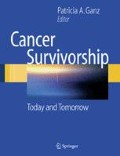Abstract
This chapter highlights the recent call by the Institute of Medicine for the use of a cancer survivorship plan to be provided to patients and their primary care providers at the end of cancer treatment. The need for evidence-based guidance on surveillance regimens after cancer treatment, how best to communicate what cancer treatments were received, and what care should be provided after treatment, as well as mechanisms to share care between oncology specialists and primary care providers is discussed. With the expanding number of cancer survivors each year, oncologists must find creative ways to ensure that the gains obtained through successful cancer treatment are not lost when patients transition to this phase of their care.
Access this chapter
Tax calculation will be finalised at checkout
Purchases are for personal use only
Preview
Unable to display preview. Download preview PDF.
References
Jemal A, Clegg LX, Ward E, et al. Annual report to the nation on the status of cancer, 1975–2001, with a special feature regarding survival. Cancer. 2004;101:3–27.
Cancer survivorship—United States, 1971–2001. MMWR Morb Mortal Wkly Rep. 2005;53:526–529.
Hewitt M, Greenfield S, Stovall E. From Cancer Patient to Cancer Survivor: Lost in Transition. Washington, DC, The National Academies Press, 2005.
Demark-Wahnefried W, Aziz N, Rowland JH, et al. Riding the creast of the teachable moment: Promoting long-term health after the diagnosis of cancer. J Clin Oncol. 2005;23:5418–5430.
Ganz PA. A Teachable Moment for Oncologists: Cancer Survivors, 10 Million Strong and Growing! J Clin Oncol. 2005;23:5458–5460.
Desch CE, Benson AB, Somerfield MR, et al. Colorectal cancer surveillance: 2005 update of an American Society of Clinical Oncology practice guideline. J Clin Oncol. 2005;23:8512–8519.
Impac tof follow-up testing on survival and health-related quality of life in breast cancer patients. A multicenter randomized controlled trial. The GIVIO Investigators. JAMA. 1994;271:1587–1592.
Muss HB, Tell GS, Case LD, et al. Perceptions of follow-up care in women with breast cancer. Am J Clin Oncol. 1991;14:55–59.
Johnson FE. Overview. In: Johnson FE, Virgo KS (eds). Cancer Patient Follow-Up. St. Louis: Mosby, 1997;4.
NIH consensus conference. Ovarian cancer. Screening, treatment, and follow-up. NIH Consensus Development Panel on Ovarian Cancer. JAMA. 1995;273:491–497.
Nordic Gastrointestinal Tumor Adjuvant Therapy Group. Expectancy or primary chemotherapy in patients with advanced asymptomatic colorectal cancer: A randomized trial. J Clin Oncol. 1992;10:904–911.
Fong Y, Cohen AM, Fortner JG, et al. Liver resection for colorectal metastases. J Clin Oncol. 1997;15:938–946.
Northover JM, Houghton J, Lennon T. CEA to detect recurrences of colon cancer (letter). JAMA. 1994;272:31.
Ohlsson B, Breland U, Ekberg H, et al. Follow-up after curative surgery for colorectal carcinoma. Randomized comparison with no followup. Diseases of the Colon & Rectum. 1995;38:619–626.
Makela JT, Laitinen SO, Kairaluoma MI. Five-year follow-up after radical surgery for colorectal cancer. Results of a prospective randomized trial. Archives of Surgery. 1995;130:1062–1067.
Kjeldsen BJ, Kronborg O, Fenger C, et al. A prospective randomized study of follow-up after radical surgery for colorectal cancer. Br J Surg. 1997;84:666–669.
Schoemaker D, Black R, Giles L, et al. Yearly colonoscopy, liver CT, and chest radiography do not influence 5-year survival of colorectal cancer patients. Gastroenterology. 1998;114:7–14.
Pietra N, Sarli L, Costi R, et al. Role of follow-up in management of local recurrences of colorectal cancer: A prospective, randomized study. Diseases of the Colon & Rectum. 1998;41:1127–1133.
Secco GB, Fardelli R, Gianquinto D, et al. Efficacy and cost of risk-adapted follow-up in patients after colorectal cancer surgery: A prospective, randomized and controlled trial. Eur J Surg Oncol. 2002;28:418–423.
Rosen M, Chan L, Beart RWJ, et al. Follow-up of colorectal cancer: A meta-analysis. Diseases of the Colon & Rectum. 1998;41:1116–1126.
Renehan AG, Egger M, Saunders MP, et al. Impact on survival of intensive follow-up after curative resection for colorectal cancer: Systematic review and meta-analysis of randomised trials. BMJ. 2002;324:1–8.
Weeks JC, Yeap BY, Canellos GP, et al. Value of follow-up procedures in patients with large-cell lymphoma who achieve a complete remission. J Clin Oncol. 1991;9:1196–1203.
Jeffrey GM, Hickey BE, Hider P. Follow-up strategies for patients treated for non-metastatic colorectal cancer (Cochrane Review). The Cochrane Library 3: Oxford-Update Software, 2002.
Figueredo A, Rumble RB, Maroun J, et al. Follow-up of patients with “curatively resected” colorectal cancer: A practice guideline. BMC Cancer. 2003;3:26
Loprinzi CL, Hayes D, Smith T. Doc, shouldn’t we be getting some tests? J Clin Oncol. 2000;18:2345–2348.
Ben-Josef E, Lawrence TS. Radiotherapy for unresectable hepatic malignancies. Semin Radiat Oncol. 2005;15:273–278.
Stiggelbout AM, de Haes JC, Vree R, et al. Follow-up of colorectal cancer patients: Quality of life and attitudes towards follow-up. Br J Cancer. 1997;75:914–920.
Grunfeld E, Mant D, Yudkin P, et al. Routine follow-up of breast cancer in primary care: Randomised trial. BMJ. 1996;313:665–669.
Kjeldsen BJ, Thorsen H, Whalley D, et al. Influence of follow-up on health-related quality of life after radical surgery for colorectal cancer. Scand J Gastroenterol. 1999;34:509–515.
Lampic C, Wennberg A, Schill JE, et al. Anxiety and cancer-related worry of cancer patients at routine follow-up visits. Acta Oncol. 1994;33:119–125.
Woodwell DA, Cherry DK. National Ambulatory Medical Care Survey: 2002 Summary. Advance Data from Vital and Health Statistics, No. 346. Hyattsville, MD, National Center for Health Statistics, 2004.
Beasley JW, Hankey TH, Erickson R, et al. How many problems do family physicians manage at each encounter? A WReN study. Ann Fam Med. 2004;2:405–410.
Jaen CR, Stange KC, Nutting PA. Competing demands of primary care: A model for the delivery of clinical preventive services. J Fam Pract. 1994;38:166–171.
Author information
Authors and Affiliations
Editor information
Editors and Affiliations
Rights and permissions
Copyright information
© 2007 Springer Science+Business Media, LLC
About this chapter
Cite this chapter
Earle, C.C., Schrag, D., Woolf, S.H., Ganz, P.A. (2007). The Survivorship Care Plan: What, Why, How, and for Whom. In: Ganz, P.A. (eds) Cancer Survivorship. Springer, New York, NY. https://doi.org/10.1007/978-0-387-68265-5_22
Download citation
DOI: https://doi.org/10.1007/978-0-387-68265-5_22
Publisher Name: Springer, New York, NY
Print ISBN: 978-0-387-34349-5
Online ISBN: 978-0-387-68265-5
eBook Packages: MedicineMedicine (R0)

